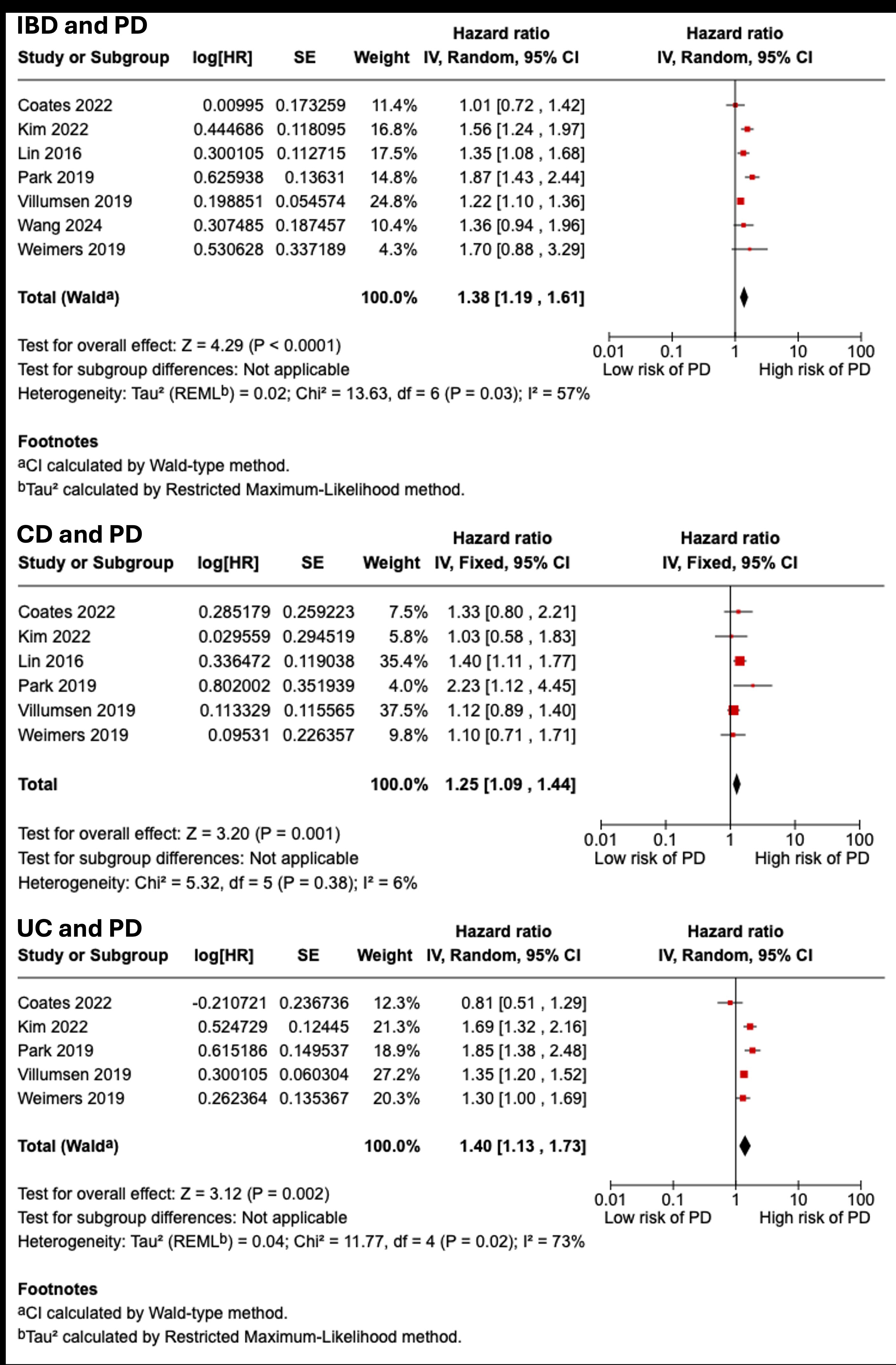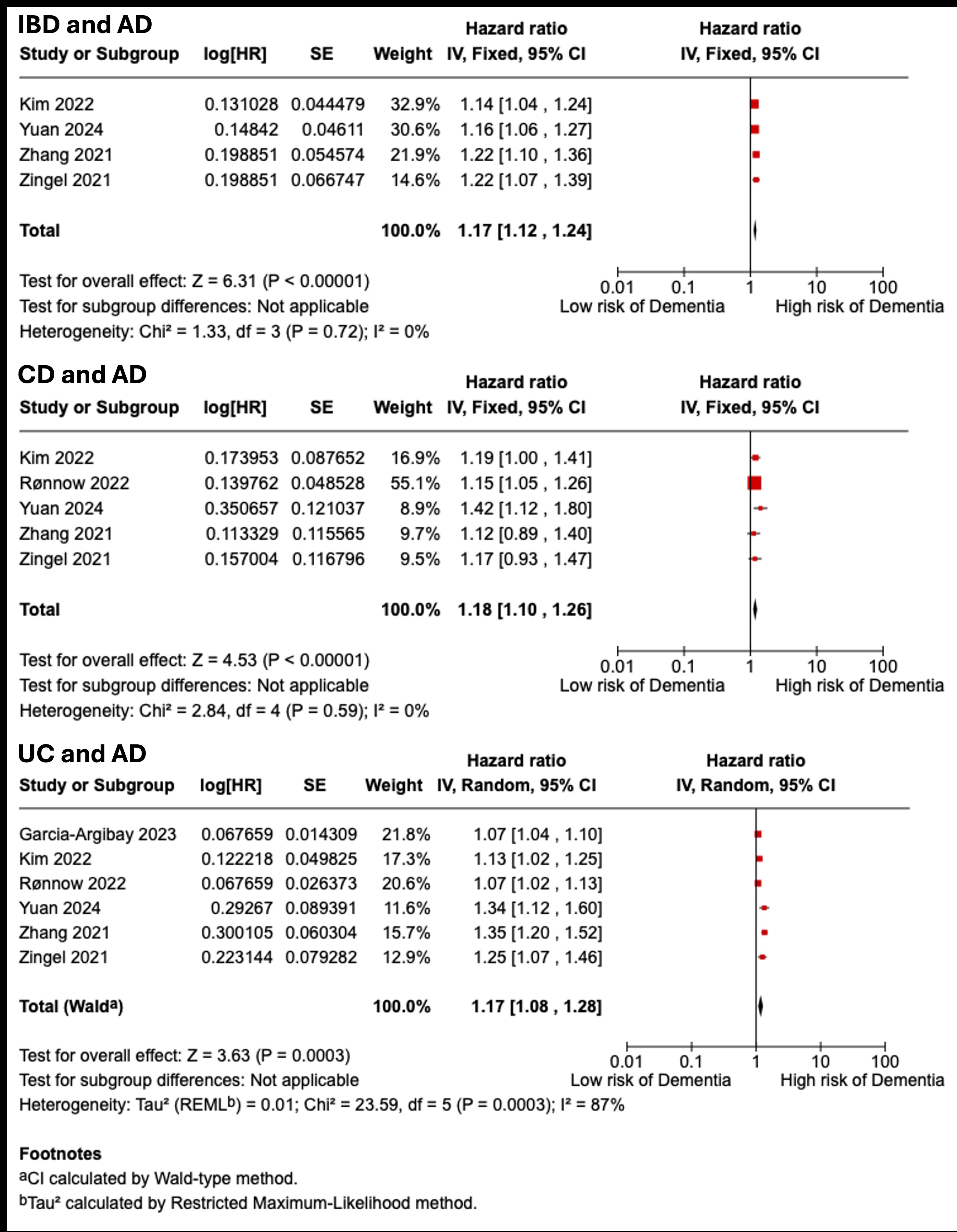Tuesday Poster Session
Category: IBD
P5336 - Inflammatory Bowel Diseases and Risks of Neurodegenerative Diseases: A Meta-Analysis
Tuesday, October 28, 2025
10:30 AM - 4:00 PM PDT
Location: Exhibit Hall
- ZZ
Zhongyuan Zhang, MD
Rush University Medical Center
Chicago, IL
Presenting Author(s)
Zhongyuan Zhang, MD1, Hyunzu Kim, BA2
1Rush University Medical Center, Chicago, IL; 2Boston University, Boston, MA
Introduction: Inflammatory bowel diseases (IBD), including Crohn's Disease (CD) and Ulcerative Colitis (UC), are chronic conditions marked by gastrointestinal inflammation. They have been linked with elevated risks of neurodegenerative diseases (NDD) such as Parkinson's disease (PD) and Alzheimer's disease (AD), but the results were often inconsistent and conflicting. IBD involves chronic intestinal inflammation that can trigger systemic immune responses, which may contribute to neurodegeneration through cytokine release and gut dysbiosis, among others. This study aims to perform a meta-analysis of observational cohort studies to determine the association between IBD and risk of NDD with the most up-to-date and comprehensive data available.
Methods: We searched PubMed from inception to May 2025, to retrieve observational cohort studies examining the associations between IBD and NDD. Studies were included if they reported hazard ratios of neurodegenerative diseases in IBD patients versus controls, with 95% confidence intervals. Meta-analysis was conducted using Cochrane RevMan online software, using random-effects or fixed-effects models to calculate pooled hazard ratios (HR) with 95% confidence intervals (CI) based on I² statistics.
Results: The initial search yielded 184 results. After screening of titles, abstracts, and full-texts, 13 met the inclusion criteria for the final meta-analysis, involving 978,239 IBD patients across multiple countries. Our findings indicate that combined IBD is associated with an increased risk of PD (HR 1.38, 95% CI 1.19-1.61) and AD (HR 1.17, 95% CI 1.12-1.24). When separated by IBD types, CD is associated with increased risks of PD (HR 1.25, 95% CI 1.09-1.44) and AD (HR 1.18, 95% CI 1.10-1.26); UC is associated with increased risks of PD (HR 1.40, 95% CI 1.13-1.73) and AD (HR 1.17, 95% CI 1.08-1.28).
Discussion: This meta-analysis, based on a substantial sample size, indicates that patients with IBD (both CD and UC) face a significantly higher risk of developing NDD (both PD and AD). These findings warrant further investigation into potential mechanisms, including the role of chronic inflammation, alterations of gut microbiota, impact of therapeutics, and others. Future studies are essential to determine whether specific IBD characteristics such as disease severity or treatment regimens modify neurodegenerative risk, as well as whether patients with IBD should undergo heightened neurocognitive screening.

Figure: Pooled HR and sensitivity analyses for IBD and PD

Figure: Pooled HR and sensitivity analyses for IBD and AD
Disclosures:
Zhongyuan Zhang indicated no relevant financial relationships.
Hyunzu Kim indicated no relevant financial relationships.
Zhongyuan Zhang, MD1, Hyunzu Kim, BA2. P5336 - Inflammatory Bowel Diseases and Risks of Neurodegenerative Diseases: A Meta-Analysis, ACG 2025 Annual Scientific Meeting Abstracts. Phoenix, AZ: American College of Gastroenterology.
1Rush University Medical Center, Chicago, IL; 2Boston University, Boston, MA
Introduction: Inflammatory bowel diseases (IBD), including Crohn's Disease (CD) and Ulcerative Colitis (UC), are chronic conditions marked by gastrointestinal inflammation. They have been linked with elevated risks of neurodegenerative diseases (NDD) such as Parkinson's disease (PD) and Alzheimer's disease (AD), but the results were often inconsistent and conflicting. IBD involves chronic intestinal inflammation that can trigger systemic immune responses, which may contribute to neurodegeneration through cytokine release and gut dysbiosis, among others. This study aims to perform a meta-analysis of observational cohort studies to determine the association between IBD and risk of NDD with the most up-to-date and comprehensive data available.
Methods: We searched PubMed from inception to May 2025, to retrieve observational cohort studies examining the associations between IBD and NDD. Studies were included if they reported hazard ratios of neurodegenerative diseases in IBD patients versus controls, with 95% confidence intervals. Meta-analysis was conducted using Cochrane RevMan online software, using random-effects or fixed-effects models to calculate pooled hazard ratios (HR) with 95% confidence intervals (CI) based on I² statistics.
Results: The initial search yielded 184 results. After screening of titles, abstracts, and full-texts, 13 met the inclusion criteria for the final meta-analysis, involving 978,239 IBD patients across multiple countries. Our findings indicate that combined IBD is associated with an increased risk of PD (HR 1.38, 95% CI 1.19-1.61) and AD (HR 1.17, 95% CI 1.12-1.24). When separated by IBD types, CD is associated with increased risks of PD (HR 1.25, 95% CI 1.09-1.44) and AD (HR 1.18, 95% CI 1.10-1.26); UC is associated with increased risks of PD (HR 1.40, 95% CI 1.13-1.73) and AD (HR 1.17, 95% CI 1.08-1.28).
Discussion: This meta-analysis, based on a substantial sample size, indicates that patients with IBD (both CD and UC) face a significantly higher risk of developing NDD (both PD and AD). These findings warrant further investigation into potential mechanisms, including the role of chronic inflammation, alterations of gut microbiota, impact of therapeutics, and others. Future studies are essential to determine whether specific IBD characteristics such as disease severity or treatment regimens modify neurodegenerative risk, as well as whether patients with IBD should undergo heightened neurocognitive screening.

Figure: Pooled HR and sensitivity analyses for IBD and PD

Figure: Pooled HR and sensitivity analyses for IBD and AD
Disclosures:
Zhongyuan Zhang indicated no relevant financial relationships.
Hyunzu Kim indicated no relevant financial relationships.
Zhongyuan Zhang, MD1, Hyunzu Kim, BA2. P5336 - Inflammatory Bowel Diseases and Risks of Neurodegenerative Diseases: A Meta-Analysis, ACG 2025 Annual Scientific Meeting Abstracts. Phoenix, AZ: American College of Gastroenterology.
